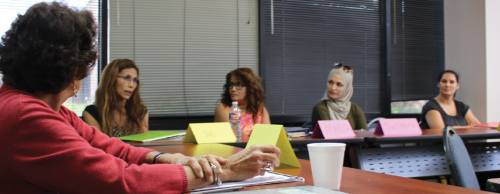Literacy Council of Fort Bend County has changed a lot in its nearly 30 years as an organization. Today it not only focuses on helping area adults attain literacy but also helps students prepare for the workforce.
The group, created in 1987 by community leaders in a local book club, offers reading and writing literacy courses. Over time, it added GED, citizenship, English as a second language (ESL), and job training courses, Executive Director Kelli Metzenthin said.
“A lot of our students start in low-level ESL and work all the way through to getting a GED and their citizenship,” Metzenthin said.
In a partnership with Houston Community College, the Literacy Council this fall started offering a general office support specialist class where students can obtain a certification in 14 weeks, which also includes a Microsoft Office certificate that requires testing.
Next semester in January, the Literacy Council will also offer a medical billing assistant course with HCC.
“We’ve taken the next step in not just helping to eliminate functional illiteracy in Fort Bend County, but also putting people to work,” Metzenthin said.
In her three years as executive director, Metzenthin has witnessed many stories of people’s personal advancement. She has seen students who go on to enroll in community college.
“I’ve also seen men come in who are Social Security-age who have worked all their lives who have provided for their families,” Metzenthin said, “But one in particular [wanted] to come in and learn to read so he can read the Bible to his grandchildren because he never could to his children.”
The Literacy Council trains about 100 volunteer tutors a year to teach the courses offered, Metzenthin said. She said the organization works with about 1,000 students each year, with about half the students in ESL classes—the nonprofit’s largest enrollment.
Many students take classes at the Literacy Council’s building at 12530 Emily Court in Sugar Land while others attend classes at satellite locations throughout the county. The satellite classrooms are provided by an outreach program where different entities, including places of worship, let the Literacy Council use their space, Metzenthin said.
Students are assessed to determine the appropriate class level in which they should be enrolled. In ESL classes, for example, there are six class levels.
Metzenthin said while the Literacy Council does not tutor children, it does help them indirectly.
“Do we directly serve children?” Metzenthin said. “No, but do we have a huge influence on children? Yes, because we serve their parents and it’s all about breaking the cycle, and children are raised by example.”
Metzenthin said it takes strength for adults to come to the Literacy Council. Classes are taken voluntarily, so Metzenthin said self-motivation is key.
“Our students come here because they want to,” she said. “It’s really hard to come in and say, ‘I don’t know.’ They have to leave their pride at the front door.”




